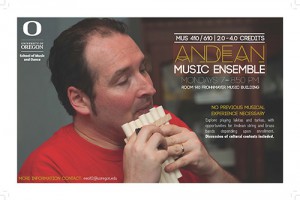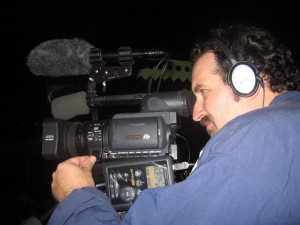MUS 410/610: Andean Music Ensemble (Variable Credit)
M 7:00-8:50 AM Room: Frohnmayer Music Building 140

One intellectual current within ethnomusicology is the idea of bi-musicality, or the ability to be fluent in more than one musical system. This course emphasizes the practice of music-dance from a specific region/culture and asks students to reflect on how this practice may compare with the musical systems they already have experience with. Students will be asked to take an embodied approach in learning. At the end of the term, students will share what they have learned with others through an end-of-term presentation. Students taking the class for credit are required to write an end-of-term research paper or produce a creative project related to region in question.
This term is dedicated to learning about the music-dance traditions of the South Central Andes, a region in which I have spent time doing field work. Several of these traditions use instruments that are relatively easily learned (lakitas and tarkas), and everyone will learn a tune in these ensembles. It may be possible to explore two other traditions, the Andean string orchestra (guitars/mandolin/flute/violin/charango) and the Andean brass band (trumpet/baritone/tuba/clarinet/ sax/trombone), depending upon what skills students bring with them to the class. All students will be expected to sing and perform basic dance steps. No prior musical experience necessary.
Selected Texts Include:
Turino, Thomas. 2008. Music in the Andes. Oxford University Press: New York.
MUS 358: Music in World Cultures
TR 8:30-9:50 AM Room: CLS 250 + Discussion Section
Beyond humanly organized sound, music is a tool to think with. The different ways in which humans use and talk about music can teach us much about each other. In this class, we will examine music-related practices from cultures associated with three different regions of the world (Fall 2014: South India, China, Hispanic Caribbean). You will learn how people raised in these cultures produce and perceive these musics as well as what concepts scholars have developed to understand these expressions more generally. Beyond exposing you to musics that you may not be familiar with, my goal is for you to apply the concepts you learn here to think critically about the multiple cultural performances you experience in your own lives. This course fulfills the IC (International Cultures) Multicultural Requirement.
Selected Texts Include:
Lau, Frederick. 2008. Music in China. Oxford University Press: New York.
Moore, Robin. 2010. Music in the Hispanic Caribbean. Oxford University Press: New York.
Viswanathan, T. and Matthew Harp Allen. 2004. Music in South India. Oxford University Press: New York.
You will also need an i-clicker for this class.
